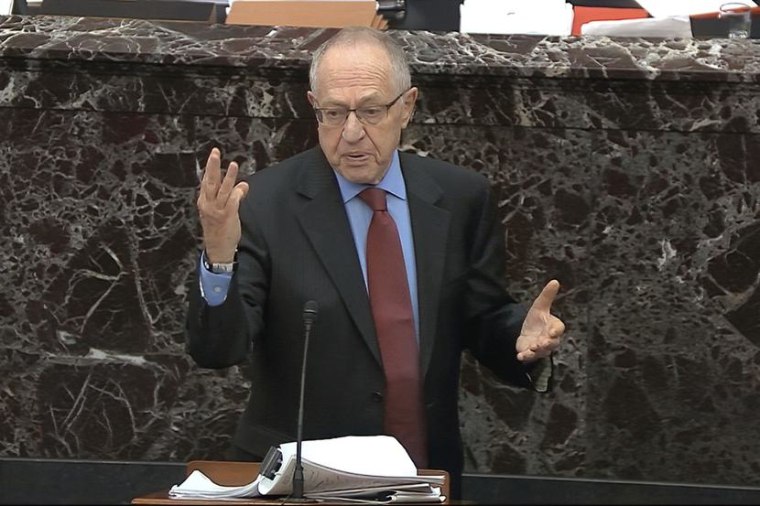Richard Nixon's Watergate scandal is known for some key moments of historic significance -- John Dean's testimony, Alexander Butterfield revealing the Oval Office recording system, Howard Baker's famous "what did he know, and when did he know it?" formulation -- but it's something the disgraced former president said years later that continues to resonate.
"When the president does it," Nixon told David Frost, "that means that it is not illegal."
The quote became unavoidable yesterday when Alan Dershowitz, a member of Donald Trump's legal defense team in the president's impeachment trial, stood on the floor of the Senate and pushed an eerily similar point: "If a president does something which he believes will help him get elected in the public interest, that cannot be the kind of quid pro quo that results in impeachment."
In other words, presidents who abuse their powers to win elections should be immune from punishment, so long as they believe their victory will benefit the public.
The reactions from the legal community were scathing. The Washington Post reported:
"It is the most ridiculous thing I've ever heard that basically the president can decide that he can bring in foreign assistance in an election and violate the law and extort people and bribe people to what he thinks is in the public interest because it's in the public interest to get him elected," Nick Akerman, a former Watergate prosecutor, told [the Post].
"He argued that if the president shot someone in the public square but believed it was in the public interest, it wouldn't be an impeachable offense," said J.W. Verret, a law professor at George Mason University. "But dictators always believe that what they are doing is in the best interest of the public -- that's the essence of an autocracy."
But as reassuring as it was to see scholars, experts, and Democrats express disgust with Dershowitz's radicalism, there was one other relevant constituency.
As University of Michigan law professor Barbara McQuade, a former U.S. Attorney and an MSNBC legal analyst, asked this morning, "Is this the cold water that might finally awaken [the Republican Party] from its stupor?"
That is the right question; GOP senators did not offer the right answer. A separate Washington Post report added that Dershowitz's "new and more expansive line of defense left some Republicans uncertain how to respond."
"I couldn't comment on that because I'm not a constitutional lawyer," said Sen. Mike Braun (R-Ind.). ]...]
Meanwhile, Sen. Tim Scott (R-S.C.) slowly separated himself from a defense of Dershowitz — before slipping away from the conversation entirely.
"I think when you conflate all the issues, you can kind of, to a point when you're asking a question in a silo, which is inconsistent with what we just heard today," Scott said. "So I want to separate myself from that part of the conversation because ultimately, I think the premise itself is flawed and I don't want to agree with that necessarily."
As best as I can tell, no one from the 53-member Senate Republican conference condemned the idea that the president can abuse his power in order to help his re-election campaign.
MORE: Today's Maddowblog

